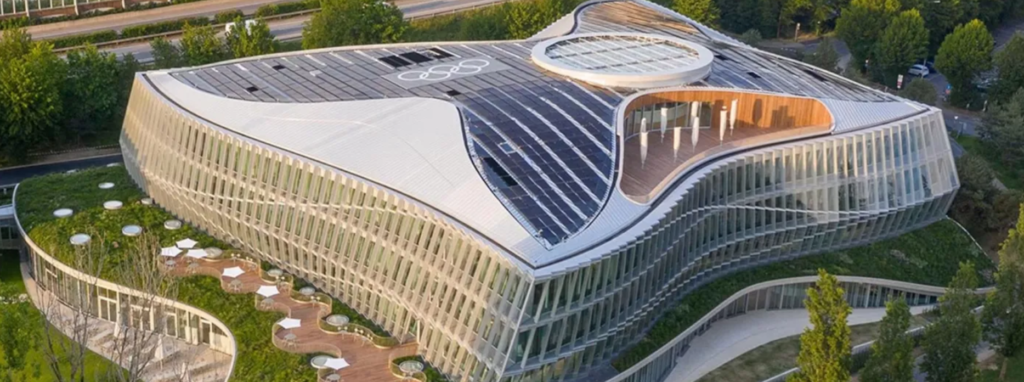
Olympic House, the headquarters of the International Olympic Committee in Lausanne, Switzerland, was recently awarded the highest possible honor for building sustainability: Leadership in Energy and Environmental Design Platinum v4.1 certification, the IOC announced in a news release reprinted on 3BL CSRwire.
The exciting achievement speaks to the five-year-old building’s eco-friendly architectural features as well as the IOC’s ongoing commitment to sustainable standards and practices.
According to the U.S. Green Building Council, LEED Platinum v4.1 status “is the next generation standard,” with ambitious requirements for energy, water use, lighting, construction, transportation, waste management, and more — a thorough framework, USGBC noted, that supports buildings “to deliver the triple bottom line returns of people, planet, and profit.”
For Olympic House, the release noted, IOC leadership prioritized “resource efficiency, circular economy, respectful integration into the local landscape, and user comfort.”
In practice, that looked like onsite solar panels (and other cheaper, cleaner energies), accessible electric vehicle chargers, incentives to choose eco-friendly and cost-effective transit, improved indoor air quality, more recycling initiatives, water conservation, and reliance on materials designed for reuse and long lifespans, among other efforts, the IOC explained in a separate overview. (For the record, climate-friendly construction need not be cost-prohibitive.)
“[We] believe the true measure of a building’s sustainability lies not only in its design and construction but also in its ongoing operations,” IOC President Thomas Bach said in the release, in which USGBC President and CEO Peter Templeton also commended the IOC for the significant achievement — recognizing Olympic House as an exemplary sustainable building that “deliver[s] higher performance while protecting people and the environment.”
An organization’s headquarters often reflect its company values. For the IOC, this is certainly the case: Its climate-forward focus — supported by innovative strategies and meaningful infrastructure investments — echoed throughout the Paris Olympic Games this summer.
The Olympics have been known for waste generation, massive expenses, and toxic pollution, all of which impact our health, finances, and lifestyles. But for Paris 2024, the IOC and its collaborators worked to preemptively confront many of those concerns, repurposing venues, limiting specific sectors’ harmful pollution, and implementing energy-efficient technologies. (Though organizers could not plan for the searing heat wave, linked to dirty energy production, that descended on the city during the Games.)
Like any gold-medal win, the top-tier sustainability status of the IOC’s operations only heightens the pressure for the future. And, like any gold-medal athlete, after a major win comes limited relaxation and lots of preparation: Milano Cortina announced its “realistic, concrete, and progressive approach” for an eco-friendly 2026 Olympics; Los Angeles has a bold game plan for 2028; and Brisbane, Australia, aims for a carbon-neutral event in 2032.
Ever watched the Olympics and thought “I wish I could do that?” Maybe you’ll never majestically flip through the air, but you can improve your sustainability skills with practice. Let the Games inspire you to cut out single-use plastic, ride your bike, donate clothes, or unplug your energy vampires. No elite athleticism necessary.
Article Credit: thecooldown